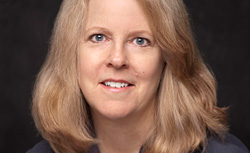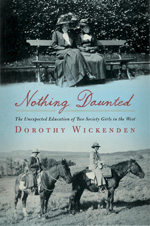?/?
books
?:?
Reading between the lines.Posted Monday, July 4, 2011, at 6:55 AM ETTo listen to Slate's Jessica Grose interview Dorothy Wickenden, the author of Nothing Daunted, click on the audio player below.
 Say you find a trove of crumbling, very old letters in the back of a desk drawer. The letters are from your grandmother, telling the folks at home about the year she and her best friend spent teaching school in a remote corner of Colorado in 1916. If you are a normal person, you read the letters, probably marvel at them, wish you'd asked your grandmother more questions about her life, futilely try to interest your husband in reading them, and then file them away. If you are Dorothy Wickenden, executive editor of The New Yorker, you write and publish Nothing Daunted: The Unexpected Education of Two Society Girls in the West.
Say you find a trove of crumbling, very old letters in the back of a desk drawer. The letters are from your grandmother, telling the folks at home about the year she and her best friend spent teaching school in a remote corner of Colorado in 1916. If you are a normal person, you read the letters, probably marvel at them, wish you'd asked your grandmother more questions about her life, futilely try to interest your husband in reading them, and then file them away. If you are Dorothy Wickenden, executive editor of The New Yorker, you write and publish Nothing Daunted: The Unexpected Education of Two Society Girls in the West.
The book raises an interesting question: What makes a story history rather than family history? Why should we bother about someone else's family, commonplace people who lived long ago? Wickenden's book also answers that question, offering a nice primer on how to write the history of ordinary life. Though the origins of the book are homely, Nothing Daunted deserves an audience beyond the folks gathered around the potato salad at the author's family reunion.
 That's because Wickenden tells a great story, with a richly appealing character at the center of it?her grandmother and namesake, Dorothy Woodruff. It's also because Wickenden understands?as writers of family history so often don't?that her grandmother is not inherently interesting qua her grandmother. Vivid characters have to face conflict, and Dorothy Woodruff's conflict was internal yet also historically resonant. She was a society girl with the heart of an adventurer. Her audacious heart inspired her to set out on the quintessential American journey: into the West.
That's because Wickenden tells a great story, with a richly appealing character at the center of it?her grandmother and namesake, Dorothy Woodruff. It's also because Wickenden understands?as writers of family history so often don't?that her grandmother is not inherently interesting qua her grandmother. Vivid characters have to face conflict, and Dorothy Woodruff's conflict was internal yet also historically resonant. She was a society girl with the heart of an adventurer. Her audacious heart inspired her to set out on the quintessential American journey: into the West.
Dorothy was a Smithie from the moneyed and even-then liberal bastion of Auburn, N.Y. So was her lifelong best friend, Rosamond Underwood, known to all as Ros. Once the two returned home from Smith, they were restless in their luncheon-heavy role as society girls. First they staved off boredom with a grand tour of Europe. They saw Nijinsky dance, visited exhibitions by the Impressionists, and rode the funicular to the Matterhorn. It's irresistible, here, to imagine an alternative history, one in which Dorothy and Ros take a more Jamesian route and become title-seeking heiresses at large in Europe. Instead, they came home and followed their more American destiny.
Back in Auburn, after a bit of casting about for something to do, they undertook the unthinkable: They got jobs. Paying jobs. Not just as school teachers, but as school teachers in Elkhead, Col. A friend from college arranged an introduction to a Wellesley grad, Ruth Carpenter Woodley, whose brother was a homesteader in Elkhead. Woodley wrote to Dorothy and Ros, encouraging them to apply for jobs as Colorado school teachers, saying that if the two young women "would like to catch a glimpse of one of the last of our fast disappearing frontiers, I'd urge you to try it."
In these opening sections of the book, Wickenden contrasts Dorothy's background with the story of Ruth's brother, Farrington "Ferry" Carpenter, the young rancher and lawyer who helped start the Elkhead school. In alternating chapters, she toggles between the girls' story and his, deftly playing out very gendered scripts without ever reducing her particular characters to roles. Carpenter was a fascinating character; as a kid, he was sent from Evanston, Ill., to Santa Fe to take the sun cure and fell in love with the West. After attending Princeton, and Harvard Law School, he went out to Colorado and was homesteading by the time he was 20. While he was planting out his claim, irrigating his land, and raising Herefords, the Auburn girls were attending meetings of the Young Ladies Benevolent Association, marveling at the new novelty food, grapefruit, and looking for meaningful volunteer work.
Like Slate Culture on Facebook. Follow Slate on Twitter.
Source: http://feeds.slate.com/click.phdo?i=c87a1b8b38dffb4bd61a16b3feeced37
mike miller jabbawockeez mtv movie awards college baseball sma kristen stewart and robert pattinson red dawn
No comments:
Post a Comment
Note: Only a member of this blog may post a comment.